
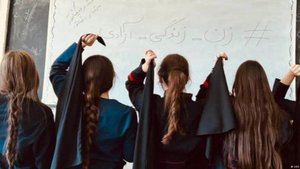
Fifteen Iranian Women Launch Hunger Strike In Prison Over Conditions
Fifteen Iranian women incarcerated in the Kachoui prison near Tehran have gone on a hunger strike to protest the conditions of their imprisonment and the lack of medical attention at the facility.
Among those on the hunger strike is 22-year-old Armita Abbasi, who was arrested on October 10 in Karaj by security forces amid nationwide protests triggered by the death of Mahsa Amini while in police custody in September.
Abbasi's mother wrote on her Instagram account that because of her daughter’s hunger strike, prison authorities no longer allow her to call her family. She also said the court did not accept the lawyer representing her daughter.
Earlier this week, the lawyer for Mohammad Mehdi Karami, a prisoner sentenced to death, noted a similar stance by the court toward him, saying it contradicted the recent claim by the head of the Supreme Court that all prisoners have the right to choose a lawyer.
In Iran, men and women are 'equal' only in torture
Many of my women friends have had therapy. When I think back to what helped us to survive all that at the time, it was the solidarity between us. I spent months in solitary confinement, on three separate occasions. Nonetheless: This togetherness, this solidarity helped a very great deal. And then I became a different person once I had written my memories down.
You have said that you're afraid now because so many women are being put in jail. Do you think it will be as bad as it was back then?
Sometimes I'm afraid it will be. These prisoners are hostages of the Islamic Republic. I hope it won't carry out executions, as it did in the 1980s. If it carries on like this, I do wonder whether there will be a repeat of those dark days. I'm hopeful, because times have changed, but I do have this fear nonetheless, because of my own experience.
I wholeheartedly support the current movement in Iran. The people are not waiting for changes in the law — they know that this Islamic law will never change: the veil, the gender segregation. They're doing it themselves — it's so beautiful, the way they're taking off their hijabs and dancing. This was always a dream, and now it's being realized. This is a special characteristic of this movement; it gives me great hope.
As a woman in the Islamic Republic, you are a second-class person. Meaning you are not worth as much as a man. But when it comes to torture and executions, you are equal. According to the ideology, women who offer resistance are seen as children to be reeducated. But this process of reeducating women was worse.
For example, we survived a form of torture reserved only for women. The women who resisted were isolated from the whole world, totally. We couldn't see anything, couldn't hear anything, for months, weeks, months. And being made to sit all the time. That was so bad. And this was their way of reeducating us.
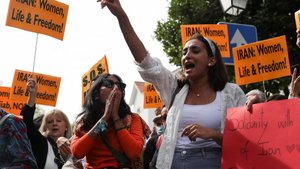
Female Detainees In Iran Kept In Inhumane Conditions, Harassed
Over 100 female protesters held at Tehran’s Qarchak Prison have been systematically abused and kept in inhumane conditions since their arrest two weeks ago.
Speaking to Iran International, a source who is familiar with the prisoners’ circumstances said they have been strip searched, repeatedly interrogated, threatened by interrogators with losing their once daily two-minute phone calls to their families.
According to the source who did not want to be named for their safety, detainees have been kept indoors in unsanitary conditions throughout this time. The lights are never turned off in the shed even at night, and there are only three toilets and showers.
“Women have developed various infections as there are no facilities for washing and drying clothes and underwear … A few women found head lice in their hair,” the source said.
On Wednesday, a religious and public holiday, protesters took to the streets again in several cities including Tehran, Esfahan, and the religious city of Qom in the evening. The video from Isfahan shows people chanting “Women, Life, Liberty” while in another video a group of protesters are seen chanting “Don’t be afraid, don’t be afraid. We stand together!” in Qom.
Iran Human Rights, a Norway-based rights organization, said Tuesday that at least 154 protesters, including nine children, have been killed by security forces during the protests.
Very little is known about most of the victims as families are pressured to remain silent if they want the bodies of their loved ones to be handed over to them.
Documentary filmmaker Javad Moguei, a hardliner and Khamenei devotee, has published a very grim account of the great violence against protesters by security forces’, IRGC’s Basij militia, and their plainclothes helpers on Instagram in the past three days.
Moguei said a police officer shot 14 plastic bullets all over his chest and arms in a matter of seconds only because he had objected to the beating of a young girl protesting on the street with no hijab.
“Don’t beat her, she will die, I cried. One of them told me to mind my own business and then my body went on fire. The officer was shooting at my chest and arms nonstop,” an apparently disillusioned Moguei who was subsequently thrown into a van and taken away wrote in one of his posts. He said he was released and officials apologized to him when he was recognized.
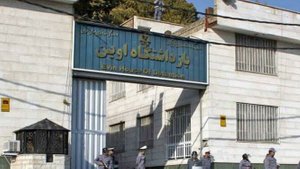
Women of Iran’s Evin Prison Raise the Alarm on Climate Change and the Future of Iran
Saturday, April 1, 2023: An open letter from a group of female political prisoners in Evin Prison has reached Zamaneh in which the authors express their deep concerns about the environmental conditions in Iran as well as the planet, for which they’ve created six main demands. They have asked all Iranians to be diligent and realize such demands for a better future.
An open letter from women political prisoners in Iran’s Evin prison:
The environment is one of the most critical concerns of humanity, and many movements have formed around it as a significant global challenge. The “climate movement” has become one of the most influential and expansive of recent activism worldwide, with close ties to diverse aspects of human life.
Unequivocal evidence has proven that climate change is taking place due to human activity. Environmental protection is essential for our beloved country and the world and, therefore, cannot and should not be ignored.
Greenhouse gas (carbon dioxide, methane, etc.) emissions that result from burning fossil fuels (such as oil and gas), together with the destruction of natural habitats, have resulted in an unprecedented change in our planet’s climate and its consequent warming. This trend has extensive adverse effects on humans, animals, and plants. The situation is dangerous to the extent that life on earth faces uncontrollable risks that are difficult to imagine.
We currently stand at a critical point; humanity’s actions during this decade will determine the path toward or away from a climate-induced catastrophe. At the same time, the Islamic Republic of Iran is making decisions about our country’s share in averting from the intensification of this crisis. According to the recent report of the special commission on Article 90 of the Iranian Parliament published on Feb 21, 2023 as well as an official statement made by the head of Iran’s Department of Environment, Mr. Ali Salajegheh, at the National Conference on Environmental Diplomacy (Feb 26, 2023), after a seven year long day, Iran’s membership in the Paris Agreement and the possibility of renewing the Nationally Determined Contribution of the country are being assessed.
In light of this critical development, we believe it is our responsibility to express our grave concern about the issue of Climate Change and the rights of future generations to a safe and healthy world and to bring attention to the fact that the current approach is threatening the future of the country and life on this planet. We must point out, with great regret, that Iran holds sixth place in the world as one of the biggest emitters of greenhouse gases but also, the most vulnerable to the diverse impacts of climate change. Greenhouse gas emissions in Iran have reached 678 million tons per year, matching those of France, Britain, Sweden, Norway, and Switzerland combined. At the same time, Iran is prone to droughts, sand and dust storms, floods, and other extreme weather events, all intensified by climate change, with devastating impacts on agriculture, the economy, drinking water, health, and other sectors.
The Paris Agreement was approved in 2015 at the 21st meeting of the members (COP21) in Paris under the framework of the United Nations Convention to Combat Climate Change (UNFCCC) and during which 195 countries of the world, including the Islamic Republic of Iran, committed to keeping the global temperature below 2 degrees Celsius, trying to limit it further to 1.5 degrees by the end of 2100. This action means reducing greenhouse gases by 45% by 2030 compared to 2010 and bringing them to zero by 2050. (i)
Iran signed this agreement in April 2016, but the parliament still needs to approve it, and therefore IRI has not officially become a member of the world agreement. (ii)
Too much time has already been lost, and the international community has been unable to avoid catastrophes effectively. Yet, many countries in recent years have taken up more serious commitments, mainly under pressure from civil society’s climate movement. The I.R.I. has not only failed to act on its obligations but is also retreating from its already meager promises to continue developing the polluting industries of oil, gas, and petrochemicals. Instead of cutting down on emissions, we are now witnessing the creation of a 4.8 km2 methane cloud in the south of Tehran from the Aradkuh waste disposal site. Methane is the cause of 30% of global warming. With 8500 kg of methane gases being emitted per hour, Aradkuh alone has become one of the world’s top three most significant sources of this dangerous greenhouse gas.
We, the female political prisoners and prisoners of belief in Evin, social, environmental, and political activists in diverse fields, mothers and grandmothers of future generations, at this moment, express our deep concern about the future of our children and our country. Despite the hardship and the suffocating problems of political, cultural, social, and other natures that cast their shadow on our lives, we demand firm national commitment and serious action to reach the goals of the Paris Agreement.
We ask all our fellow Iranians to consider the urgency of the climate crisis with a deep understanding of the issue and to include it as a vital part of their civic demands. By joining the global climate movement, rather than being part of the problem, we can become part of the solution.
In this regard, we believe that the following actions are both necessary and possible in the context of Iran while taking into account social and climate justice and supporting vulnerable communities as well as public inclusion in decision-making, especially the decision of women, youth, local communities, and ethnic minorities:
Moving away from fossil fuels and taking advantage of the country’s great potential in renewable energy (solar and wind).
Conservation and rehabilitation of ecosystems that absorb carbon dioxide ( forests, wetlands, Persian Gulf’s coral reefs, etc.).
Shifting to a low-carbon economy and climate-resilient development.
Reducing pollution, increasing energy efficiency, reducing natural gas leakage in production, and using clean technology.
Disaster risk reduction through ecosystem-based and other necessary approaches.
Concrete action towards adaptation of industry, agriculture, integrated water resource management, and other areas to inevitable impacts of climate change.
For Pirouz and all the children of Iran who have been deprived of healthy nature!
i Under the Paris Agreement, each country has its voluntary commitments. These are called Nationally Determined Contributions (N.D.C.s). When signing this agreement, I.R.Iran committed to a 4% reduction in greenhouse gas emissions by 2030 compared to 2010 and an 8% decrease conditional on removing economic sanctions, clean technology transfer, carbon credits, etc. Both goals have yet to be reached.
ii The planet’s average temperature has increased by 1.1 °C compared to preindustrial times. Unless immediate action is taken, we will reach a 2.4-6.5°C increase by the end of the century, conditions that humanity has never experienced. (Source: Intergovernmental Panel on Climate Change. 2022 report.)
Petitioners
Narges Mohammadi, Sepideh Qolian, Nahid Taghavi, Fariba Kamalabadi, Maryam Hajhosseini, Vida Rabani, Faeze Hashemi, Niloufar Bayani, Sepideh Kashani, Mahvash Sabet, Zahra Zehtabchi, Fatemeh Mosana, Sara Ahmadi, Raha Askarizdeh, Noushin Jafari, Hasti Amiri, Narges Zarifian, Zhila Makvandi, Mojgan Inanlou, Asal Mohammadi.
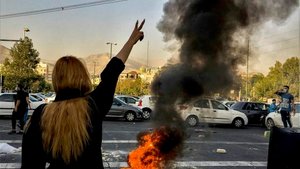
Iran: Women political prisoners demand end to protester executions and unjust sentences
Thirty women political prisoners in Iran, including a Franco-Iranian academic and the daughter of a former president, demanded on Sunday, January 22 an end to the executions of protesters in the country.
"We, the political and ideological prisoners in the women's ward of Evin Prison, demand an end to the execution of protesters and an end to unjust sentences of prisoners in Iran," they said in a petition. The women inmates said they had been "sentenced to a total of 124 years in prison through unfair and non-transparent procedures, which is worth a few generations of human life." Despite coming from different religious and political backgrounds, "we have come together to say 'no' to execution. We defend people's right to live in justice."
The signatories included Franco-Iranian researcher Fariba Adelkhah, arrested in June 2019 and later sentenced to five years in prison for undermining national security, allegations her family has strongly denied. Another is former lawmaker Faezeh Hashemi, the daughter of former president Akbar Hashemi Rafsanjani, who was sentenced to five years behind bars in January for "collusion against the security of the country."
Niloufar Bayani, a former representative of the UN Environment Programme in Iran who was handed 10 years in jail in 2020 for "conspiring with America as a hostile government," also signed.
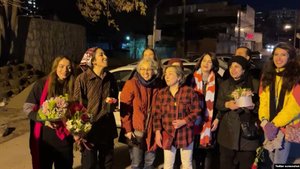
Iran Releases 7 Women Activists from Prison
paris —
Iran has released several prominent women activists and journalists from Tehran's Evin prison, campaigners said Thursday, with video showing them defiantly chanting pro-protest slogans outside the jail.
Media based outside Iran said a total of seven women were released, while Iran continues to press a crackdown against protests that erupted in September.
Those released included Saba Kord Afshari, held since 2019 after she campaigned against the obligatory hijab for women, and prominent photographer Alieh Motalebzadeh whose latest stint in jail began in April last year, the reports said.
After being released, they chanted the slogan of the protest movement "Woman, Life, Freedom" and "down with oppressors worldwide," according to a video posted by Motalebzadeh on her Twitter account.
"Khamenei's hypocritical pardon doesn't change anything," said Mahmood Amiry-Moghaddam, director of the Norway-based Iran Human Rights group, describing the move as propaganda.
Iranian authorities have arrested thousands since nationwide protests broke out following the September 16, 2022, death in custody of Mahsa Amini, a 22-year-old ethnic Kurd who had been arrested for allegedly breaching the country's strict dress rules for women.
Women still detained include prize-winning rights defender Narges Mohammadi, the two journalists who helped expose the Amini case, Niloufar Hamedi and Elaheh Mohammadi, as well as foreigners including German national Nahid Taghavi and French academic Fariba Adelkhah.
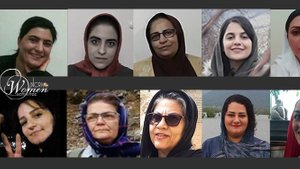
Persecution of human rights defenders and execution of women in Iran
The main forms of violence against women in Iran are carried out by state agents and sponsored by the state. On the final day of 16 days of activism to eliminate violence against women, coinciding with the World Human Rights Day, we will briefly review arbitrary arrests, persecution of human rights defenders, civil rights activists and women political prisoners as well as the execution of women in Iran.
Violence against human rights defenders
Human rights defenders are one of the groups of women who constantly face state-sponsored violence. The Iranian regime has intensified its crackdown on women in recent years. The regime views human rights defenders as threats to national security. Therefore, there is no national law or policy to protect human rights defenders, and the rights of the Declaration are not respected.
Scores of women defenders are persecuted for their legitimate work.
Human rights defenders are subjected to torture, including mock executions, beatings, sleep deprivation and denial of access to adequate medical care; arbitrary arrest and detainment followed by unfair trials; violent dispersal of peaceful protests; travel bans and harassment of human rights defenders’ family members including their children.
It was revealed in February that conservationists Niloufar Bayani and Sepideh Kashani had been viciously tortured mentally and physically and sexually harassed. The interrogators tried to compel them to write false confessions against themselves.
Mary Mohammadi, a Christian convert, was arrested during the protests to the IRGC downing of the Ukrainian passenger aircraft in January 2020. She was tortured and sexually and physically harassed during her interrogations. She was forced to take off all her clothes and do squats.
The arrests of human rights lawyers are also part of an attempt by the authorities to prevent them from being able to defend their clients, who are often human rights defenders or individuals who face the death penalty, including for crimes committed as a child.
Violent arbitrary arrests
The arrest and imprisonment of people for their political or religious beliefs is contrary to the international law. Article 18 of the Universal Declaration of Human Rights stipulates: “Everyone has the right to freedom of thought, conscience and religion.”
The clerical regime ruling Iran, however, has numerous agencies to clamp down on the public, each of which acts independently to arrest anyone who opposes the regime. The State Security Force (SSF), the Islamic Revolutionary Guard Corps (IRGC), the paramilitary Bassij, and even the disciplinary committees at the universities are components of a vast network that cracks down on the Iranian people’s freedom of thought, expression and gathering.
These agencies arrest women in public or at home, often without presenting legal warrants and by use of brute force and violence.
The regime made a wave of arrests of civil rights activists over the past year, despite the pandemic plaguing Iranian prisons, despite lack of minimum hygienic equipment and detergents.
Some of the women arrested over the past year included Nazanin Tousi, Farzaneh Jalali, Jhaka Esma’ili, Gita Horr, Raha Ahmadi, Mojgan Eskandari, Samira Hadian, Maryam Alishahi, Melika Gharagozlou, Baran Behzad, Shahnaz Sadeghifar, Hajar Saeedi, Zahra Jamali, Maryam Khoshandam, Roghieh Hassanzadeh, Fariba Fereydouni, Somayyeh Namadmal, Saba Azarpake (journalist), Yalda Emamdoust, Zeinab Hamrang, Soghra Pour Eshragh, Sedigheh Morsali, Mehraban Keshavarzi, Zahra Rahimi, Kowsar Karimi (journalist), Touran Haml Zehi, Zeinab Alipour, Leila Akbari, Parizad Hamidi Shafaq, Zohreh Sarv, Khadijeh Mehdipour, Ashraf Nafarieh, Elham Samimi, Aliyeh Motallebzadeh, Shabnam Ashouri, Neda Pirkhezranian, Bahareh Soleimani Nahid Taghavi, Maryam Payab, Raheleh Ahmadi, Leila Tirandari, and Parisa Seifi.
Farangis Mazloum spent time in solitary confinement and under torture for defending her son, political prisoners Soheil Arabi. The Revolutionary Court of Tehran initially sentenced her to six years in prison but later commuted her sentence to 18 months in prison.
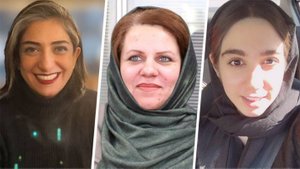
An everyday occurrence in Iran: three more women journalists jailed in Tehran, marking 55 arrests since the start of protests
Melika Hashemi, from the online daily Shahr News Agency, was called in for questioning at the notorious Evin prison on 21 January, but after the journalist went in, all contact with her was lost. The next morning, on 22 January, Mehrnoush Zarei and Saeede Shafiei joined her in prison. With these three new arrests in less than 48 hours, the Iranian government continues its crackdown on women journalists. In total, 25 of the 55 journalists arrested since the start of the protests on 16 September, following Mahsa Amini’s death, have been women.
“The Islamic Republic must immediately release journalists Melika Hashemi, Saeede Shafiei and Mehrnoush Zarei, as well as all reporters, photographers, and bloggers detained in connection with the Mahsa Amini protests,” says the head of RSF’s Middle East desk Jonathan Dagher. “The frequency of arrests, the numbers, the brutality… All paint an image of a government determined to cut off the flow of information. But the journalists are just as stubborn: despite the endless arrests, they courageously continue to do their work.”
Mehrnoush Zarei, a freelance journalist who had contributed to publications such as ILNA, ISKA, and Chelcheragh was arrested in front of her home in Tehran, Iran’s capital. According to the HRANA news agency, the security forces that arrived at her home did not present their institutional affiliation. After searching the premises and confiscating her digital devices, they arrested the journalist and drove her to Evin prison. The reasons for her arrest are also unknown.
A few kilometers away the same morning, the Islamic Revolutionary Guard Corps (IRGC) were arresting Saeede Shafiei, the freelance journalist who had collaborated with Donyaye Eghtesad, Shargh, and Insaf News. A tweet by Saeede’s husband Hassan Homayon, revealed that she was arrested by security forces on Sunday morning. “Saeede Shafiei, my dear wife, called from the detention center at noon today, the 23rd, and said that she is in Evin prison. She was arrested on the morning of the 22nd,” he wrote. Reports have suggested that Saeede was being charged with "propaganda against the system and action against national security".
Eight journalists arrested since the beginning of 2023
Since the beginning of 2023, authorities have so far arrested eight journalists and photographers due to their journalistic activities. Four of them were later released on bail, awaiting sentencing. These releases are no cause for celebration, however. In recent days, Iranian courts have ruled on many of these cases, issuing long sentences to journalists who had been awaiting the verdicts outside of prison.
Photographer Ahmad Halabisaz, who spent 27 days in prison in the early days of protest, announced on 16 January, that he had been sentenced to two years in Evin prison. On 17 January, journalist Alireza Khoshbat who was previously arrested on 22 September and released on bail after 94 days, also received a five-year prison sentence by the 29th Branch of the Revolutionary Court of Tehran, in addition to one more year for engaging in “propaganda activities against the regime”
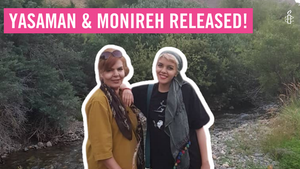
Yasaman & Monireh released!
As an act of peaceful protest against forced veiling laws, women's rights defenders Monireh, Yasaman and Mojgan handed out flowers to female passengers on a metro train in Tehran in Iran
The unveiled women were filmed sharing their hopes for a future where all women in Iran would have the freedom to choose what to wear.
Days after the video went viral on social media, they were charged with sham offences including ‘inciting prostitution’ for choosing not to wear veils and were sentenced to 31 years 8 months in prison between them.
An incredible 235,000 of you signed the petition demanding their release. Mojgan was released from prison early last year, and on 15th February 2023, Yasaman and Monireh were also released.
As they left prison, they hugged loved ones and chanted "Woman, Life, Freedom" - the slogan of the protest movement in Iran that followed the killing of Mahsa Amini.
Thank you to all of you who signed the petition, shared the campaign with networks and helped fight for their freedom.
Iranian Feminism and “All These Different Kinds of Veils
For the past two months, following the detention and death of Mahsa Amini, a twenty-two-year-old Kurdish Iranian woman, protests have shaken the Islamic Republic ofIran. The regime of Ayatollah Khamenei has so far been unable to stamp out thedissent, which has focussed particularly on the fact thatwomen in Iranare forced to wear a covering for their hair. (Amini was arrested for apparently revealing too much of hers.) To talk about the state of the protest movement, and the fissures in Iranian society, I recently spoke by phone with the anthropologist Homa Hoodfar, a professor emerita at Concordia University in Montreal. Her work has ranged across Afghanistan, Pakistan, Egypt, and Iran, with a special focus on the place of women in Muslim societies, and on the politics of the veil. (In 2016, Hoodfar, who was born in Iran, spent more than three months in jail there after authorities arrested her for “dabbling in feminism.”)
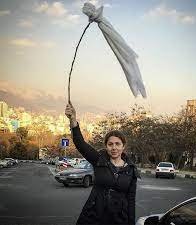
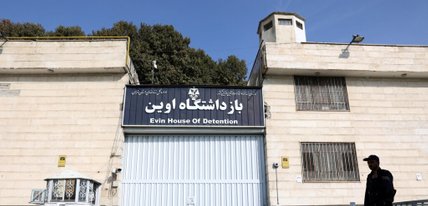
نرگس محمدی از اوین: تعرض به زنان معترض «جنایات حکومت» و «ابزار سرکوب» است
نرگس محمدی، فعال حقوق بشر زندانی در نامهای از زندان اوین، ضمن افشای جزییاتی از آزار و اذیت و شکنجه زنان بازداشتشده در جریان اعتراضات سراسری، «تعرض جنسی به زنان معترض را ابزاری برای سرکوب معترضان» از سوی جمهوری اسلامی دانست.
بخشهایی از این نامه روز شنبه سوم دیماه همزمان با صدمین روز اعتراضات سراسری در ایران در وبسایت بیبیسی فارسی منتشر شد.
خانم محمدی در این نامه تعرض فیزیکی و جنسی به زنان معترض را «جنایات حکومت» توصیف و تاکید کرده است: «افشا نکردن آن موجب تداوم این شیوه سرکوبگرانه علیه زنان میشود».
سخنگوی کانون مدافعان حقوق بشر ایران نوشته است که در روزهای اخیر شماری از بازداشتشدگان اعتراضات از محل دستگیری در خیابانها و یا سلولهای انفرادی بندهای امنیتی اوین و نیز برخی بازداشتگاههای نامعلوم و زندان قرچک ورامین به بند عمومی زندان اوین منتقل شدهاند و «روایتهای تکاندهندهای از شیوه تعرض به زنان» را بازگو کردهاند.
به گزارش بیبیسی فارسی به نقل از نامه خانم محمدی، یکی از این زنان بازداشتی روایت کرده است که «در سلول بازجویی در زندان قرچک مورد تعرض فیزیکی از ناحیه سینههایش توسط بازجو قرار میگیرد که پس از داد و فریاد او، بازجو از سلول بیرون میرود».
در نمونهای دیگر، نرگس محمدی به شرح بازداشت خشونتآمیز «یکی از فعالان شناختهشده زن» اشاره کرده است که «حین انتقال به زندان با دستبند یک دست و پایش را به گیرههای بالای سرش در ماشین بسته بودند و در حالتی که او آویزان بوده با دست مورد تعرض جنسی قرار گرفته» و نیز «آثار کبودی و زخم روی شکم و دور مچ دست و پایش» مشهود است.
خانم محمدی در بخش دیگری از نامه اخیر خود، دادخواهی زندانیان از مقامهای جمهوری اسلامی از جمله حشمتالله حیاتالغیب، رییس سازمان زندانهای تهران و کاظم غریبآبادی، مسئول حقوق بشر قوه قضاییه را «بیتاثیر» دانسته است.
او تصریح کرده است که در پی اعتراض بازداشتشدگان به این نوع برخوردها، دو تن از معترضان شامل ویدا ربانی و مژگان اینانلو را از زندان قرچک به اوین منتقل کردند «تا صدای اعتراضشان شنیده نشود».
سخنگوی کانون مدافعان حقوق بشر ایران پیش از این نیز در نامهای به جاوید رحمان، گزارشگر ویژه حقوق بشر سازمان ملل در امور ایران، خواهان تحقیق درباره «تعرض جنسی به زنان بازداشتی» شده بود.
بهدنبال انتشار برخی گزارشها مبنی بر «تعرض جنسی» به زنان زندانی در ایران، سازمان زندانها روز ۱۶ آذر با انتشار اطلاعیهای وقوع چنین مواردی را تکذیب کرد.
سازمان زندانها در اطلاعیه خود بدون اشاره به نام شخص خاصی اظهاراتی از این دست را «ادعاهای کلی و بدون ذکر مصداق در فضای مجازی» و «شایعه» خوانده است.
شبکه خبری سیانان روز سیام آبانماه در گزارشی تحقیقی، نیروهای جمهوری اسلامی را به خشونت و آزار جنسی معترضان ایرانی در بازداشتگاهها متهم کرد
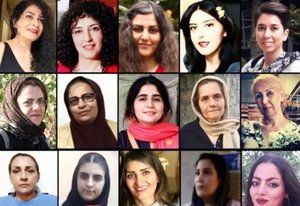
مقاومت در برابر حجاب اجباری: پنج نفر از زندانیان بند زنان اوین متهم به مقاومت در برابر حجاب اجباری هستند.
برای مقاومت در برابر حجاب اجباری: پنج نفر از زندانیان بند زنان اوین متهم به مقاومت در برابر حجاب اجباری هستند. نرگس ظریفیان، اسرین در کاله، اکرم نصیریان، صبا کردافشاری و مریم محمدی. این زنان در مجموع ۷۹۰ روز در انفرادی بودهاند و میزان محکومیتشان ۱۳ سال است.
برای پادشاهیخواهی: سه نفر از زندانیان زن اوین متهم به پادشاهیخواهی و فعالیت در فضای مجازی در راستای پادشاهیخواهی هستند. گلاره عباسی، شکیلا منفرد و فریبا اسدی. این زنان در مجموع ۱۱۰ روز در انفرادی به سر بردهاند و ۹ سال و ۹ ماه محکومیت گرفتهاند.
برای روزنامهنگاری، عکاسی و مستندسازی: رها عسگری، عالیه مطلبزاده، نوشین جعفری و ویدا ربانی از زنان روزنامهنگار و عکاسی هستند که نامشان در فهرست زندان زنان اوین است. همینطور مژگان ایلانلو که مستندساز است. این زنان در مجموع ۳۲۸روز در انفرادی بودهاند و ۲۱ سال و ۷ ماه محکومیت دارند.
برای فعالیت محیط زیستی: نیلوفر بیانی و سپیده کاشانی هم که از متهمان پرونده محیط زیست در ایران هستند در زندان اوین بسر میبرند. این دو نفر در مجموع ۱۴۶۰ روز در انفرادی بودهاند و ۱۶ سال محکومیت دارند.
برای دو تابعیتی بودن: در بین این زندانیان دو نفر هستند که دو تابعیت دارند. فریبا عادلخواه شهروند ایرانی-فرانسوی است و ۶۳ سال دارد. او پژوهشگر مرکز مطالعات علوم سیاسی دانشگاه پاریس است و به اتهام جاسوسی دستگیر شده است.۹ ماه را در انفرادی گذرانده و ۵ سال طول مدت محکومیت اوست. ناهید تقوی هم ۶۸ سال دارد شهروند دو تابعیتی ایرانی-آلمانی ۲۵ مهر ۱۳۹۹ در آپارتمان خود در تهران بازداشت شد. او در رابطه با اتهاماتی از جمله «عضویت در یک گروه غیرقانونی» و «فعالیت تبلیغی علیه نظام» به ۱۰ سال و هشت ماه زندان محکوم شد. ۶۸ سال سن دارد و به مدت ۲۲۰ روز در انفرادی بوده است. این در حالی است که بارها از سوی فعالان حقوق بشر این شائبه مطرح شده که هدف از بازداشت دوتابعیتیها گروگانگیری برای تسویهحسابهای سیاسی و اقتصادی است. پیشتر محسن رضایی، معاون اقتصادی رئیس دولت به صراحت گفته بود که میتوان از گروگانگیری برای حل مشکلات اقتصادی نظام بهره برد.
در بین این زندانیان نامهای آشنایی مانند بهاره هدایت، فائزه هاشمی، نرگس محمدی و سپیده قلیان هم هستند اما آنچه مسلم است زندانیان زنی هم هستند که به دلیل اتهاماتشان رسانهها کمتر به آنها پرداختهاند از جمله کسانی که به اتهام همکاری با سازمان مجاهدین خلق در زندان هستند و یا کسانی که اتهامشان توهین به رهبر جمهوری اسلامی یا تبانی علیه نظام است. در این میان کسانی که با اتهام همکاری با سازمان مجاهدین خلق در این بند هستند ۷ نفرند و در مجموع هزار و صد و یک روز در انفرادی بوده اند و مدت محکومیتشان ۵۲ سال و ۶ ماه است.
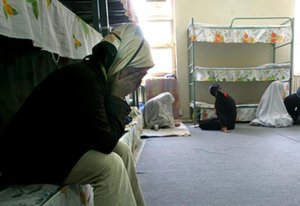
زندانیان زن در ایران با تحقیر، تعرض جنسی و تنبیه بدنی روبرو هستند
زنان زندانی در ایران، بویژه زندانیان سیاسی، در حالی مکررا و سیستماتیک مورد تعرض جنسی، تنبیه بدنی و هتاکی قرار می گیرند که، این دست از جنایات از سوی نهادهای امنیتی، زندان ها و مسئولین حکومتی به روالی عادی مبدل، و کاملا در ساختار اداری نهادهای مرتبط نهادینه شده است.
ابراهیم رییسی (رییس دستگاه قضایی کنونی) و کاندیدای ریاست جمهوری آتی که در سایه حمایت های بی شائبه ی خامنه ای، یکه تاز جاده منتهی به پاستور هم هست، یکی از مسئولین حکومتی می باشد که، این موارد در دوران مسئولیت او رو به افزایش بوده و کماکان نیز ادامه دارد.
در همین زمینه و طی روزهای اخیر، شماری از زنان و فعالین حقوق بشری طی گفتگویی در شبکه ی اجتماعی "کلاب هاوس"، از اعمال شکنجه، تحقیر، آزار روحی و روانی، تجاوز و غیره از سوی بازجویان سخن گفتند.
اقداماتی فراقانونی و غیر انسانی که در سایه حاکمیت رژیم جمهوری اسلامی از گذشته تا کنون، به برنامه ای هدفمند از سوی بازجویان و با هدف شکستن زندانیان زن و حتی مرد اعمال شده و می شود.
این امر تنها مختص به زنان زندانی در ایران نیست و دیگر زندانیان، خانواده های منتقدین، فعالین سیاسی و مدنی و غیره از سوی نهادهای امنیتی و سپاه بارها مورد تهدید به تجاوز جنسی قرار گرفته اند و این موضوع به عنوان ابزاری در راستای سرکوب، ساکت کردن، اعترافات اجباری و... در دستور کار نهادهای مرتبط قرار دارد.
در ضمن، کنشگران سیاسی و فعالین مدنی بر این باورند که، تابوی تعارض جنسی به زندانیان زن در زندان ها و بازداشتگاه های ایران باید شکسته شود، تا که چهره ی سیاه و ماهیت واقعی این حکومت، بیش از گذشته خود را نشان دهد.
با این وجود، آزارها و تعرض جنسی و تهدید های کلامی، تنها به فعالین سیاسی و یا دیگر فعالان در عرصه های مختلف ختم نمی شود، بلکه این شیوه ی رفتارها نیز شامل زنان عادی که به بهانه های مختلف دستگیر و یا حتی بازداشت موقت می شوند، خواهد شد و این موارد، از ٤٢ سال پیش تا کنون در زندان های ایران اعمال می شود.
موضوعی که سالیان متمادی است که در بازداشتگاه ها و زندان ها صورت می گیرد.
این مسئله طی سال های اخیر و با بالارفتن فساد در ساختار دستگاه قضایی، یکه تازی نهادهای مربوطه، توجیه شرعی و یا قانونی این مُهم، بیشتر خود را نمایان می کند. تجاوز به زندانیان در کهریزک یکی از نمونه های بارز، و در عین حال از مصادیق نقض فاحش و آشکار حقوق بشر در دستگاه بیداد ایران و زندان های حکومتی است.
نتیجه: محکوم کردن این دست از اقدامات غیرانسانی و فراقانونی و دادگاهی کردن مسببان و بانیان آن از راس هرم تا پائین، تابو شکنی و افشاگری قربانیان جنسی در زندان های ایران، آگاهی دادن به جامعه، دخالت مجامع بین المللی و ورود آنان به زندان ها بدون محدودیت، مداخله ی نهادهای حقوق بشری و...
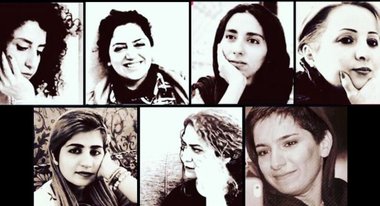
هفت زن زندانی سیاسی در نامهای خواستار توقف صدور و اجرای حکم اعدام در ایران شدند.
نرگس محمدی زندانی سیاسی با انتشار نامهای در حساب اینستاگرامش توسط ادمین نوشت: « ما تعدادی از زندانیان سیاسی بند زنان زندان اوین تصمیم گرفتیم به بهانه پنجمین سالگرد بازداشت فعالان محیط زیست حمایت خود را از آنها اعلام نموده و خواهان پشتیبانی نهادهای بین المللی حقوق بشری و افکار عمومی و آزادیخواهان برای آزادی آنها شویم.»
نرگس محمدی، سپیده قلیان، بهاره هدایت، عالیه مطلبزاده، رها عسگری زاده، نوشین جعفری و هستی امیری امضا کنندگان این نامه هستند.
این هفت تن با بیان اینکه ، مجازات «اعدام» و سلب «حق حیات» یکی از فاحشترین موارد نقض حقوق بشر است و جراحت ناشی از آن هرگز التیام پیدا نمیکند نوشتند: «دهههاست که جامعه ایران درد اعدام عزیزانش را بر دل نشانده و این روزها دوباره شاهد اعدام تعدادی از جوانان معترض بودهایم که تعدادی از آنها هنوز در معرض خطر اعدام قرار دارند.»
آنها در این نامه اضافه کردند :«ما زنان زندانی سیاسی در محبسی به سر میبریم که سایه شوم احکام اعدام و تهدید به مرگ بر سر تعدادی از همبندیهایمان سنگینی کرده است، فعالان محیط زیست که به باور مردم ایران از شریفترین و پر تلاشترین ایرانیان برای حفظ محیط زیست و آینده سرزمینمان ایران هستند ، از جمله آنها میباشند، آنها با پروندهسازیهای بیاساس سپاه پاسداران بازداشت شدند و ۲ سال در سلولهای انفرادی بند امنیت تحت فشارهای روحی و روانی و جسمی قرار گرفتند ، تا به کارهای نکردهای اعتراف کنند که بازجویان سپاه اعدام را برایشان تدارک ببینند.»
در ادامه این نامه آمده است: «یکی از منزجرترین ابزارهای بازجویان برای اعمال فشار برای اخذ اعتراف ، نمایش صحنه اعدام برای این افراد بوده و حقیقتا تهدید به اعدام در تنهایی و بی کسی سلولهای انفرادی ، فاصله چندانی با اعدام ندارد.»
این هفت زندانی زن با نام بردن از همبندان خود تصریح کردند: «سپیده کاشانی و نیلوفربیانی دو همبندی ما در کنار سایر همکارانشان در چنین شرایطی روانه دادگاه فرمایشی شده و بدون وجود هیچ نوع ادله قانونی و مستندات حقوقی «جاسوس» خوانده شده و حتی با اتهام «افساد فی الارض» مواجه شدند، مریم حاج حسینی یکی دیگر از همبندیان ما ، که از برگزیدگان و منتخبان علمی کشور است ، به مدت ۴۱۲ روز را در خانه امن وزارت دفاع در منطقه ای دور از شهر تهران حبس بوده و همواره با تهدید حکم اعدام به موجب اتهام افساد فی الارض مواجه بوده است، مهوش شهریاری و فریبا کمال آبادی ماههای طولانی در سلولهای انفرادی و تحت فشار های روحی و روانی و جسمی شدید، از بدو بازداشت به دلیل باورهایشان با تهدید حکم اعدام به موجب اتهام افساد فی الارض و جاسوسی مواجه بودهاند،فشارهای روانی و شکنجه های جسمی علیه زینب جلالیان برای اخذ اعتراف دروغ مبنی بر انجام عملیات مسلحانه صورت گرفت که او هرگز نپذیرفت، اما تلاشهای نهادهای امنیتی برای اعدام شیرین علم هولی منجر به اجرای حکم او شد.»
به نوشته نرگس محمدی این زندانیان سیاسی زن در نامه خود ضمن ابراز انزجار از حکم اعدام و سلب حق حیات و هر گونه شکنجه از افکار عمومی خواستند تا برای توقف حکم اعدام معترضان از پای ننشینند.
نرگس محمدی ۱۶ دی ماه نیز در گزارشی تفصیلی مشخصات ۵۸ تن از زنان محبوس در بند عمومی اوین را شرح داده که ۳۳ تن از آنها به گفته او مادر هستند و برخی از آنان کودکان خردسال دارند.
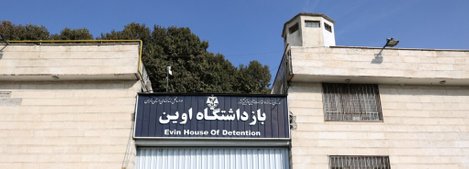
نامه اعتراضی ۳۰ تن از زنان زندانی سیاسی اوین
نفر از زنان زندانی سیاسی و عقیدتی اوین که خود جمعاً به ۱۲۴ سال زندان محکوم شدهاند، با امضای نامهای سرگشاده خواستار توقف اعدام معترضان و پایاندادن به احکام ناعادلانه زندانیان شدند.
بهگزارش خبرگزاری فرانسه، این زنان زندانی که فریبا عادلخواه، پژوهشگر ایرانی-فرانسوی، و فائزه هاشمی هم جزو آنان هستند، در نامه خود که یکشنبه دوم بهمن منتشر شد، آوردهاند «ما گرد هم آمدهایم تا به اعدام نه بگوییم. ما از حق مردم برای زندگی در عدالت دفاع میکنیم».
این ۳۰ زن زندانی در اوین همچنین یادآوری کردهاند که بهخاطر رویههای «ناعادلانه و غیرشفاف» جمعاً به ۱۲۴ سال زندان محکوم شدهاند که «ارزش چندین نسل از زندگی انسان را دارد».
این نامه در حالی منتشر میشود که بر اساس گزارش سازمان حقوق بشر ایران دستکم ۱۰۹ نفر از معترضان بازداشتشده در جریان سرکوب اعتراضات «زن زندگی آزادی» با خطر اجرا یا صدور حکم اعدام روبهرو هستند.
و این جدا از چهار معترضی است که جمهوری اسلامی آنان را بهاتهام «افساد فیالارض و محاربه» و بدون دسترسی به وکیل و دادرسی عادلانه اعدام کرده است: محسن شکاری، مجیدرضا رهنورد، محمدمهدی کرمی و محمد حسینی.
در بیش از چهار ماه که از اعتراضات سراسری میگذرد، دستکم ۴۸۱ شهروند نیز بهدست مأموران حکومت کشته شدهاند که دهها تن از آنان کودک بودهاند. در این فاصله حدود ۲۰ هزار معترض نیز بازداشت و زندانی شدهاند که هنوز گزارش دقیقی از شمار آنها و وضعیتشان منتشر نشده است.
اسامی ۳۰ زن زندانی اوین که این نامه را امضا کردهاند از این قرار است: سارا احمدی، نرگس ادیب، افسانه امامی، ثمین احسانی، الناز اسلامی، هستی امیری، نیلوفر بیانی، ناهید تقوی، نوشین جعفری، مریم حاج حسینی، زهره داوری، زهره زیوری، زهره سرو، بهاره سلیمانی، نرگس ظریفیان، مهناز طراح، گلاره عباسی، فریبا عادلخواه، رها عسکریزاده، هاله غلامی، سپیده کاشانی، مروارید فرتومی، سپیده قلیان، شهره قلیخانی، نازنین محمدنژاد، ژیلا مکوندی، فرنگیس مظلوم، روشنک ملایی، ملیحه نظری و فائزه هاشمی.
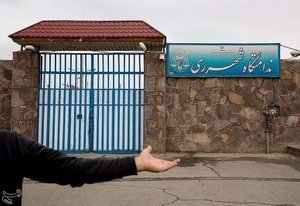
اینجا «زن و زندگی» زندانی است
چندی پیش پایگاه خبری قوه قضاییه خبر از آزادی ۹۷۵ نفر از زنان زندانی و محکوم با آزادی مشروط یا سایر ارفاقات قانونی داد و اعلام کرد حدود ۶ هزار نفر از زنان زندانی در سراسر کشور نیز به مرخصی اعزام شدند.
به دلایل مختلف آمار قابل استنادی از زندانیان در ایران وجود ندارد٬ اما پس از انتشار این گزارش عماد باقی، رئیس کمیته دفاع از حقوق زندانیان این پرسش را مطرح کرد که مگر چه تعداد زندانی زن وجود دارد که به «نزدیک ۷هزار نفر» از آنها در این خبر اشاره شده است.
آمار زندانیان زن در ایران یک تا دو درصد بوده و در سال ۱۳۹۳به ۳ درصد رسیده بود. اما احتمالا این آمار در سالهای اخیر که زنان بیشتری به دنبال آزادی انتخاب سبک زندگی خود هستند بیشتر شده است.
یکی از گزارشهای مهم در خصوص وضعیت زندان زنان، اطلاعاتی است که نرگس محمدی فعال مدنی و حقوق بشر به تدریج از زندان محل نگهداریش منتشر میکند. او به تازگی از زندان اوین گزارشی داده که نام ۵۸ زندانی زن به همراه اطلاعات روزهای انفرادی، میزان محکومیت و وضعیت سلامت آنها را در بر میگرفت.
یکی از نکتههای قابل توجه این گزارش تعداد روزهایی است که در مجموع این زنان در انفرادی گذراندهاند؛ ۸۳۵۰ روز!
با نگاهی به دلیل بازداشت این زنان درمییابیم که بخش زیادی از آنها نه بهخاطر فعالیت سیاسی یا جرایم حقوقی که بهدلیل مذهبشان یا روش زندگی متفاوت با آنچه در جمهوری اسلامی مرسوم است به زندان افتادهاند. برخی هم حتی به دلایل انسانی مانند دفاع از فرزندشان دستگیر شدهاند.
برای مادری کردن: فرنگیس مظلوم ۵۸ سال دارد و به اتهام فعالیت برای آزادی پسرش سهیل عربی که از مخالفان نظام جمهوری اسلامی است دستگیر شده است. ۲۰ روز در انفرادی بوده و مدت محکومیتش نه ماه است. اطلاعات سپاه پاسداران سهیل عربی فرزند خانم مظلوم را سال ۱۳۹۲ به خاطر انتشار مطالبی در فیسبوک، به اتهام توهین به مقدسات بازداشت کرده بود.
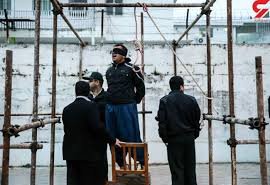
ابراز «انزجار» دفتر حقوق بشر سازمان ملل از آمار اعدامها در ایران
دفتر حقوق بشر سازمان ملل متحد در ژنو روز سهشنبه گفت که ایران در سال جاری تاکنون - چهار ماه و ۹ روز گذشته - ۲۰۹ نفر را اعدام کرده است که آن را رکوردی «مایه انزجار» خواند و خواستار توقف آن شد. همزمان خبرگزاری هرانا گزارش میدهد که روند اعدام ها در روزهای اخیر سرعت گرفته به طوری که در ۱۱ روز ۵۷ نفر در این کشور اعدام شدهاند.
راوینا شامداسانی سخنگوی دفتر حقوق بشر سازمان ملل در یک کنفرانس خبری گفت: «ولکر تورک رئیس حقوق بشر سازمان ملل مراتب یاس خود را از شمار ترسناک اعدامهای سال جاری در ایران ابراز کرده است.»
او گفت: «در سال جاری به طور متوسط هر هفته بیش از ۱۰ نفر در ایران اعدام شدهاند، که این کشور را به یکی از بالاترین اجراکنندگان حکم اعدام در جهان بدل میکند.»
او گفت که بیشتر اینها به دلیل جرایم مرتبط با مواد مخدر بوده است.
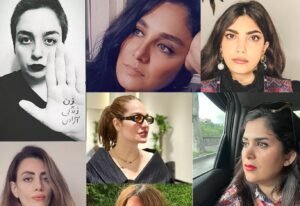
زنان زندانی: مقابل دوربینهای امنیتی از بدن برهنه ما عکس گرفتند
زنان زندانی بهتناوب در معرض تهدیدها و آزارهای مبتنی بر جنسیت قرار میگیرندــ عکسها از رسانههای اجتماعی
زخم کهنه آزارهای جنسی زنان در زندانها و بازداشتگاههای جمهوری اسلامی با روایت مژگان کشاورز، فعال حقوق زنان، سر باز کرد و تعرضهای جنسی ساختارمند ماموران امنیتی حکومت علیه زنان زندانی بار دیگر در کانون توجه قرار گرفت.
مژگان کشاورز در روایتی که در حساب کاربری «میتو ایران» منتشر شد، نوشت که ماموران زندان او را وادار کردهاند بهطور کامل برهنه شود و سپس از بدن برهنهاش عکس گرفتهاند. اندکی پس از انتشار این روایت، زنان دیگری که تجربه مشابه داشتند، افشاگری کردند و از آزارها و تعرضهای جنسی در زندانها و حین بازجوییها پرده برداشتند. فراوانی روایتهای جدید و روایتهای پیشین این نکته را اثبات میکند که آزار جنسی زنان در زندانها رویهای متداول است و با هدف تحقیر زنان زندانی انجام میشود.
مژگان کشاورز در روایت خود نوشت که او را یک بار در بازداشتگاه امنیت اخلاقی تهران در خیابان وزرا و یک بار در زندان قرچک ورامین مقابل دوربینهای امنیتی بهطور کامل برهنه کردهاند و هنگامی که دلیل این کار را پرسیده، به او پاسخ دادهاند: «به خاطر اینکه اگر از اینجا خارج شدی، نگویی من را شکنجه کردهاند.» این زندانی سیاسی در ادامه از احساس «تجاوز»، «ترس» و «خجالت» که احاطهاش کرده بود، سخن گفت و نوشت هنگامی که سعی داشت با دست اندام جنسیاش را بپوشاند، مامور زندان فریاد زد: «رو به من بایست، دستهات رو بردار، حالا بشین پاشو کن با پاهای باز.»
کشاورز همچنین افشا کرد که در سلول انفرادی مجبور بود مقابل دوربین، حمام کند و دستشویی برود و به همین دلیل «حس تجاوز» تمام روح و جسمش را گرفته بود و دانستن اینکه بازجوها موقع دوش گرفتن بدن لختش را میبینند، عذابش میداد.
روایت تکاندهنده مژگان کشاورز از تجربه آزار جنسی در زندان بازتاب وسیعی در رسانهها و فضای مجازی داشت اما وقتی ابعاد گستردهتری پیدا کرد که زنان دیگری نیز زبان به افشاگری گشودند.
مهناز افشار، بازیگر سینما که اکنون در خارج از ایران زندگی میکند، با انتشار یادداشتی در توییتر نوشت هنگامی که تازه کارش را در سینما آغاز کرده بود، ویدیویی از یک دختر بدون لباس منتشر شد که وانمود میکرد مهناز افشار است. در پی انتشار این ویدیو، مهناز افشار به اداره آگاهی احضار شد و در آنجا یک مامور زن به او گفت: «لخت شو!»
آنطور که این بازیگر سینما روایت کرده، بازرسی بدنی مهناز افشار برای «تطبیق دادن» بدن او با ویدیو منتشرشده بود. مهناز افشار میگوید: به مامور زن گفتم چرا لخت کامل؟ دست راست من بخیه دارد، همین را تطبیق دهید، آنوقت میفهمید من نیستم اما از من اصرار و از آنها انکار.
این بازیگر در پایان روایتش نوشت که در نهایت از بدن برهنهاش عکس گرفته شد اما «هر دوری که برای عکس میزدم، در درونم فرو میریختم و از تجاوز به روح و روانم عذاب میکشیدم».
زینب زمان، کنشگر حقوق زنان، نیز در روایتی نوشت که در زمان بازداشت او را دومرتبه وادار کردهاند مقابل ماموران بهطور کامل برهنه شود و بشین پاشو برود. او همچنین گفت که در سلول انفرادی کم غذا میخورد تا کمتر مجبور شود مقابل دوربینها از دستشویی سلول استفاده کند.
نسیبه شمسایی، زندانی سیاسی سابق، هم یکی دیگر از راویان آزارهای جنسی در زندانهایی جمهوری اسلامی است که افشا کرد او را سه مرتبه در بند ۲ الف سپاه پاسداران در زندان اوین، زندان قرچک ورامین و بعد از یک ملاقات حضوری کاملا برهنه کردهاند.
او چنین روایت میکند: «خانم نگهبان گفت تمام لباسهات رو درآر. وایستاده بود روبروم. کامل به همه بدنم نگاه میکرد. گفتم نمیشه که! گفت منبعد همهچی شدنیه! با اجبار، کاملا برهنه، دوبار بشین پاشو بهم داد. به این بهانه که چیزی تو واژنمون پنهان نکرده باشیم.»
شمسایی میگوید بار سوم که مجبورش کردند برهنه شود، پریود بود اما زنان زندانی بهطور دائم در معرض این تحقیرها و شکنجههای روانی قرار میگرفتند.
شیما بابایی، زندانی سابق سیاسی، نیز در روایتی افشا کرد هنگامی که مقابل مامور زن مقاومت میکرد و قصد نداشت لباسهایش را دربیاورد، صدای مردی از اتاق مجاور را شنید که با دشنام خطاب به او فریاد زد کاری را که مامور زن میگوید، انجام دهد.
شاپرک شجریزاده، از دختران خیابان انقلاب، نیز با انتشار روایتی در حساب کاربریاش نوشت که او را هم مجبور کردند در زندان برهنه شود. او نوشت: «سعی میکردم اندام جنسی و سینههام رو بپوشونم، مامور با لحن تندی گفت دستت رو بردار و حالا بشین پاشو. بهش گفتم نمیتونم. باز تشر زد.»
فاطمه خوشرو، یکی دیگر از زندانیان سابق، نیز در روایتی نوشت: «بازجویم پرسید چرا قدم میزنی تو سلول؟ چرا نمیخوابی؟ چرا دراز نمیکشی؟ گفتم مگه نامحرم نیستم؟ چطور شما من رو در سلولم و در خصوصیترین لحظات تماشا میکنید؟ گفت تو وقتی مییای اینجا، به ما محرم میشی.»
آنچه مژگان کشاورز، مهناز افشار، زینب زمان، نسیبه شمسایی، شیما بابایی، شاپرک شجریزاده و فاطمه خوشرو از تجربه آزار جنسی و روانی خود روایت کردند، تنها بخشی از دهها روایت آزارهای مبتنی بر جنسیت در بازداشتگاهها و زندانهای جمهوری اسلامی ایران است.
روایتهای زنان زندانی و شواهد موجود آشکار میکند که تجاوز، تعرض و آزار جنسی زنان زندانی از همان روزهای نخست استقرار جمهوری اسلامی آغاز شد و تاکنون نیز ادامه دارد. زنان زندانی بهتناوب در معرض تهدیدهایی مانند تجاوز، الفاظ رکیک جنسی، لمس بدن و دیگر آزارهای مبتنی بر جنسیت قرار میگیرند و این آزارها از لحظه بازداشت آنان آغاز میشود و تا دادگاه و زندان ادامه مییابد. آزارگران هم طیف وسیعی از زنان و مردان حکومتیاند که با چراغ سبز نهادهای امنیتی، زنان را شکنجه روحی میدهند.
پیشتر هنگامه شهیدی، نیلوفر بیانی، سعدا خدیرزاده، سپیده قلیان، نرگس محمدی و مژگان کاووسی نیز از آزارهای جنسی زنان زندانی پرده برداشته بودند. سال گذشته پس از اینکه سعدا خدیرزاده، در یک فایل صوتی از داخل زندان افشا کرد برای که برای اعتراف کردن با آزارهای جنسی کلامی مواجه شده است، ۱۶ زن زندانی سیاسی از داخل زندان اوین افشا کردند که زنان زندانی همواره در معرض آزارهای مبتنی بر جنسیت قرار دارند.
نرگس محمدی که در کتاب «شکنجه سفید» روایتها و شهادتهای بسیاری از آزار جنسی زنان در زندانهای ایران را مستند کرده، پیشتر در خاطراتش نوشته بود که آزار و تعرض جنسی زنان زندانی برنامهای هدفمند است که بازجوها برای شکست مقاومت زندانی از آن استفاده میکنند.